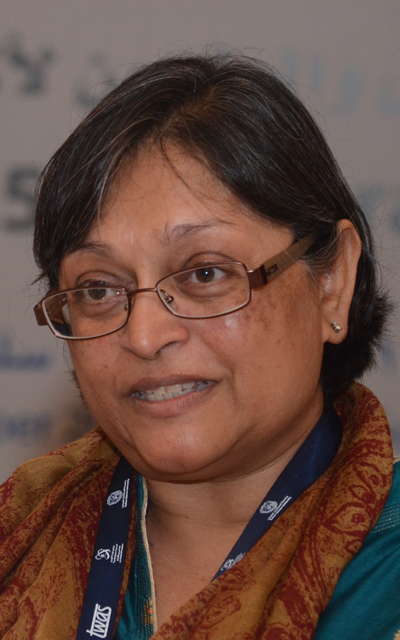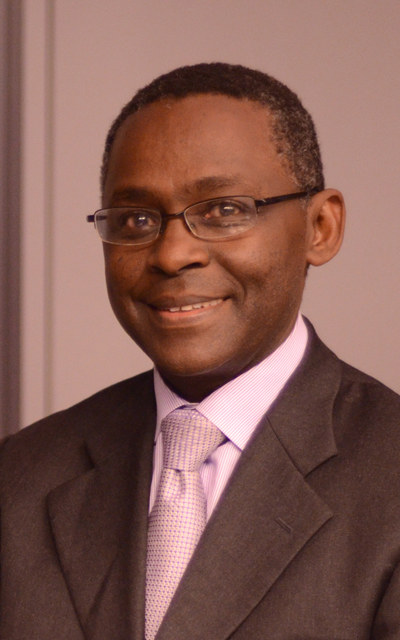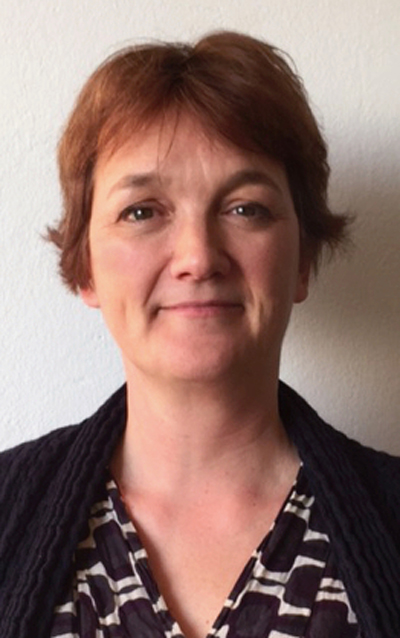With more than 37 million people infected by the HIV and about 5,600 new cases per day - 1,000 just in South Africa - the epidemic is amongst the world's most severe in recent decades. Still, the disease doesn't hit the headlines as it once did. Thirty years after its peak, HIV infection remains a global burden, but it tends to be forgotten.
Quarraisha Abdool Karim, an infectious diseases epidemiologist and a 2015 TWAS Fellow, has dedicated her scientific career - indeed her life - to preventing new HIV infections in young girls and helping virus-infected women cope with the disease.
"Young women are important in society and they deserve the right to a full and healthy life," Abdool Karim told the audience. "My first survey on the HIV epidemic in South Africa, in 1990, showed that women were more prone to infection than males. This drove my efforts to find a safe and efficacious HIV prevention technology for women." Her team at the Centre for the AIDS Programme of Research in South Africa (CAPRISA), where Abdool Karim is the scientific director, found a vaginal gel formulation that holds promise in protecting women from HIV infection.
Abdool Karim, who is also a professor of epidemiology at the Mailman School of Public Health, Columbia University, was the major panelist in a round table at the recent Genoa Science Festival, held at Palazzo della Borsa, Sala delle Grida.
The event – titled "A gel against HIV" – was jointly organized by the Italian Ministry of Foreign Affairs and International Cooperation and TWAS, in the frame of a long-lasting partnership. It was chaired by Pierguido Sarti, scientific attaché to the Ministry of Foreign Affairs in Pretoria, South Africa.
Other speakers were Romain Murenzi, the executive director of TWAS, and Tonya Blowers, programme coordinator of the Organization for Women in Science for the Developing World. Ugo Ferrero, from the Scientific and Technological Cooperation Unit at the Italian Ministry of Foreign Affairs, was in the audience.
Abdool Karim presented her scientific contribution to the prevention of HIV infections, proving the importance of health education, follow-up assistance and outreach activities in high-risk communities. Science and education, she observed, must play an ambitious role as they can better the quality of life of millions of people who experience poverty, low-quality medical treatment, social injustice and exclusion.
Abdool Karim explained that she found a drug that can block the AIDS virus, which belongs to the retrovirus family because of the way it replicates in the human body. The drug – an anti-retroviral active principle called tenofovir – is a chemical compound that can be delivered in the form of a gel, as a vaginal ring or injected periodically. The drug is effective for another reason: It gives women a powerful tool to prevent infection even without the cooperation of their partners.
With no side effects, tenofovir proved to prevent both herpes simplex infections and infections from HIV in women (the latter up to 54%), if patients follow the prescriptions. This discovery has earned Karim prestigious prizes. In 2012, she was selected as a TWAS Prize winner for medical sciences, and in 2014 she won the Academy's highest honour, the TWAS-Lenovo Science Prize. (Lenovo, a global leader in consumer, commercial, and enterprise technology, is the largest PC company in the world.)
"Today HIV affects young women in particular, especially in Africa," she explained. The risk of infection starts early among young women, and rises rapidly: at about 16 years, 11.5% of pregnant women test positive for HIV. But at 25 or older, about 52% of pregnant women are HIV positive.
Infection rates among young men are not nearly so high, and so their education and careers are less likely to be disrupted. "Many young female students, on the contrary, do not finish high school," said Abdool Karim. "So we are facing an educational gap between women and men caused by early HIV acquisition. We need to stop this trend because women are not in the position to negotiate: the only way to keep infections under control is through prevention, both before and after sex."
Her research, and the global recognition it has received, have brought Abdool Karim and CAPRISA a significant degree of political support from South African leaders. "Thanks to South Africa's pledge," she said in Genoa, "we could ask for further contributions from other governments, making impressive progress." Abdool Karim and her team patented their discovery and then gave it to the government of South Africa. Now the drug is widely accessible, and current antiretroviral therapies cost less than USD$30 per month compared to thousands of dollars when the drugs first emerged in the fight against HIV.
As the research has progressed, Abdool Karim and her team have found two women from the Kwa Zulu Natal region who have developed broadly neutralizing antibodies towards HIV. The antibodies grant more than 80% protection against the viral infection, and now Abdool Karim and her team are developing a new project based on the administration of these molecules to induce passive immunity.
"There is no global challenge that science, international collaboration and science diplomacy cannot overcome: from gender bias, to infectious disease, to career-building education, to any other problems that the world is facing today," said Ugo Ferrero in comments from the floor. "Major discoveries stem from international cooperation and technological know-how, and from access to education."
During the Genoa event on 30 October 2015, TWAS Executive Director Romain Murenzi stressed that the Academy works to support the sort of scientific excellence embodied by Abdool Karim. Nurturing sustainable prosperity through education is also crucial, Murenzi said. He mentioned TWAS's research grants programme, which has distributed more than 2,400 grants since 1986, help develop and support laboratories in the developing world.
"Science in developing countries, in Africa in particular, needs more resources and funds," he observed. "During the Transform Africa Summit 2015 held in Rwanda last year, I urged the participants to be science advocates in their countries. We cannot achieve transformations if governments do not view science as a priority for development." 
Tonya Blowers, OWSD programme coordinator, explained that women need to be at the forefront of research and, at the same time, to be the beneficiaries of research outcomes. In a similar way, Blowers added, developing countries must be part of active decision-making processes because they have unique knowledge of local problems and can contribute to the search for solutions.
That's a core mission for both TWAS and OWSD: supporting women scientists in the world's least developed countries, where there are few universities and where women, in particular, often have limited opportunities to receive education.
Blowers told the story of Hanna Ajoge, a Nigerian woman whose desire was to become a doctor, like her father. Hanna received a grant from OWSD that has allowed her to carry out her OhD research on the effect of HIV on pregnant women at the University of KwaZulu Natal in Durban, South Africa.
Thanks to OWSD support, Ajoge was able to both care for her young child and complete her PhD. Recently she was selected to attend a meeting in Lindau, Germany, where she had an inspirational opportunity to interview some Nobel laureates.
"Today Ajoge has a strong career and is part of a group of scientists, all women, who have decided to work with and for pregnant women, to help them fight dangerous viral diseases," Blowers explained. "OWSD is hosted by TWAS, supported by the Italian goverment. The funds for OWSD fellowships come directly from the Swedish International Development Cooperation Agency (Sida), who have supported OWSD since 1998."."
A dynamic discussion followed the presentations, in which the public sought to understand why the disease hasn't been defeated after so many years of research and experience. This disease is complex, Abdool Karim replied, and science has no quick solutions. It evolves and improves along a unique course, following what works and dropping what doesn't. But that requires time.
Cristina Serra

